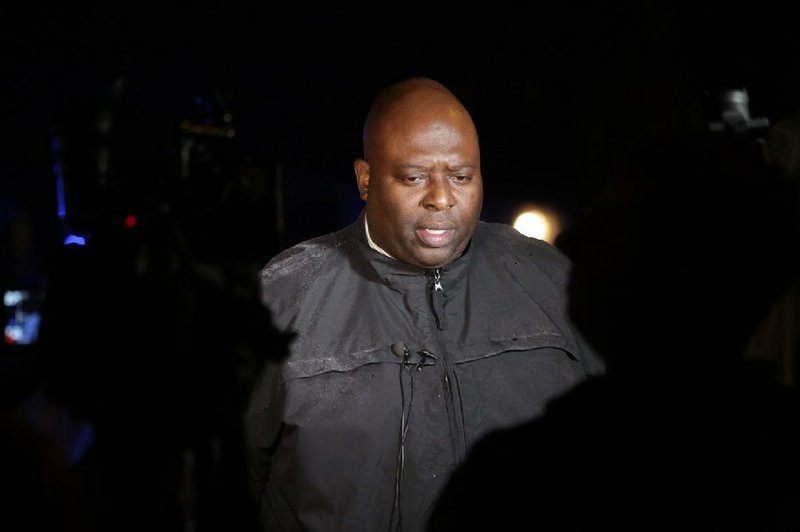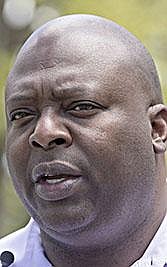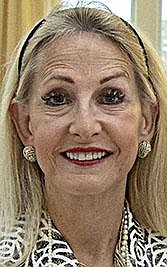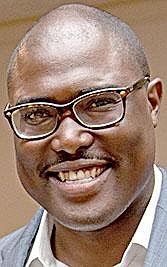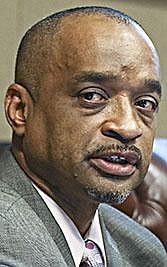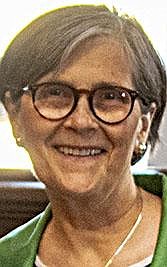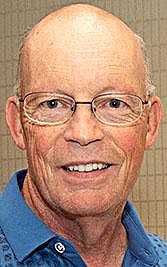With Friday's exit of Little Rock Police Chief Kenton Buckner, people in the city say the next police chief must focus on mending long-standing divides in the community and in the department.
The police chief, whose salary is up to $142,663, oversees 594 sworn officers and a department budget of $75.5 million, according to materials distributed by the city.
The search for Buckner's successor comes at a time of increased scrutiny of law enforcement agencies nationally but also on the Little Rock department, which faces multiple lawsuits and received recent national attention over some of its practices.
Police chiefs' average tenure is 2½ to three years in large cities, according to the Police Executive Research Forum, which studies policing in America. At any given time, multiple American cities are looking for police chiefs.
Just days after Buckner's Nov. 2 announcement of his departure, City Manager Bruce Moore revealed plans to name the department's three assistant chiefs as interim leaders on a rotating basis during the 90 days Moore estimated it would take to advertise, interview and select a new chief.
That time frame is short compared with how long it took Syracuse, N.Y., to choose Buckner as its new chief. Its search began in late 2017 and included a two-month community study to determine what qualities residents wanted most in their new department leader.
With much on the line, Little Rock residents -- elected officials, police officers, neighborhood leaders -- want their voices heard as Moore chooses the next police chief.
COMMUNITY POLICING
Outgoing Mayor Mark Stodola and City Directors Ken Richardson and Brenda "B.J." Wyrick agree that the new chief's primary focus should be on community policing.
"Every officer should be a community police officer," Stodola said. "That means when they're responding for calls to serve, they're understanding the human element of those calls."
Wyrick said that sometimes encouraging community policing simply means allowing officers to stay in a neighborhood long enough to get to know the residents and the culture.
"One of the things that I didn't agree with the chief on is that he would rotate people from position to position occasionally," said Wyrick, city director for Ward 7. "That was his purview to do -- as he told me -- but when you get somebody that people in the community are willing to talk to, I feel like that's not the appropriate thing to do."
Wyrick said it's necessary, too, for the new chief to form personal relationships with the community, something she said Buckner sometimes fell short on.
Buckner "had some issues in working with some of the people in the community to the point where they didn't want to talk to him because he was so abrupt with everybody," Wyrick said.
Stephanie Lopez, president of the Riverside Neighborhood Association in the northern part of Little Rock, said "police officers [should be] driving through the neighborhoods at all times of night and day. I think it's important for neighborhoods to have that visual."
"A lot of the crime that's been going on in these areas continues to thrive," she said. "We need to increase the number of officers and increase their pay if we want to see results."
Mayoral candidate Frank Scott Jr. said he would like to see the number of officers grow from 594 to 700 and for the new chief to emphasize recruiting new officers to complement the diverse cultures in Little Rock, ensuring that the officers could communicate and understand the people they serve.
"I think we historically have seen a need for the community to build a relationship with the LRPD and for the LRPD to build a relationship with the community."
Richardson, city director for Ward 2, said, "We always talk about [community policing] and a lot of my colleagues say they want it, but we need to really understand what that is." He said it's "being in the community and, ideally, they would live in that community."
Richardson said that could build trust between Little Rock communities and the department.
"The next chief needs to, from my standpoint, bring leadership and the notion that the Police Department is there to protect and serve all parts of Little Rock," Richardson said. "In some parts of the city, it's seen that they are here to patrol and control -- not protect and serve."
Part of earning and keeping community trust, Richardson said, is holding officers accountable when they break faith with the community.
"The next police chief needs to be certain and adamant about holding all officers accountable for misdeeds or actions that are not truly representative of our Police Department," Richardson said. The new chief should have as a priority establishing positive relationships with the people of Little Rock, he said. "The high-crime areas are the ones where officers really need to have positive, productive relationships. But they view each other as adversaries, not friends."
A UNIFIED DEPARTMENT
City Director Kathy Webb said it's also necessary to reinforce relationships within the department.
"I think that we need a police chief who can bring more unity to the department," Webb said. "I think I'm not alone in the perception that we've got discord in the department."
Allegations of racial bias in the department surfaced in March when four officers filed a federal lawsuit saying they had faced discrimination while working there. Among the allegations was a claim that Buckner had created a hostile work environment for officers in the Little Rock Black Police Officers Association.
"The conflict between the black and white officers, I don't know what the answer is, but everyone needs to understand they are important, valid employees," Wyrick said. "We need them all in this city, and it has to be somebody special who could work the different issues between the two groups."
Sgt. Rodney Lewis, president of the Black Police Officers Association, said there is no inherent animosity among officers who are members of the Fraternal Order of Police and those of the black officers group. Many officers are members of both unions, he said.
Lewis said he hopes the new police chief will include the black officers association in the department's decision-making.
"We desire to have at least a seat at the table," Lewis said. "We feel as though sometimes we get the short end of the stick. We don't get the phone calls from the city manager's office. We're actively pushing to be heard in our agency and for them to give us some credence in the department."
Lewis said the first step to any unification is just sitting down together. "First, get everybody at the table," he said. "Put all the cards on the table and work on the differences that we may have."
THE RIGHT POLICIES
Mayoral candidate Baker Kurrus said the next chief should be chosen by the residents of Little Rock and the city's leaders. He said he is interested in changing the process for choosing a chief.
He would like to reduce the role of the city manager, who currently leads the decision-making in choosing a chief, and redistribute that power to the city board and the community.
"That's a big change," he said. "You have to find someone but before you go looking I think you need to articulate as a community what you're looking for."
In light of recent allegations that the Little Rock police had violated his civil rights when they executed a "no knock" warrant on Roderick Talley's residence on Aug. 10, 2017, as well as other allegations of a lack of oversight in officers' hiring processes, Webb said it will be important for the new chief to review the policies of the department in confronting accusations.
Both issues gained national attention when they were published in opinion columns for The Washington Post.
"I think we have to look and make sure the policies we have are being followed and make sure the policies we have are the right policies," Webb said. "I think we have to be willing to look at some of the negatives that have been written and things that have occurred and be willing to address those head-on."
John Gilchrist, president of the Little Rock Fraternal Order of Police, said litigation and upheaval will happen in any police chief's time in office, and that the new chief must be ready to face the current allegations and any other controversy that might arise.
"The tempo and the feeling toward law enforcement, that pendulum has swung to one side right now," Gilchrist said. "They're going to have to be ready to answer those questions. One of the things [Buckner] taught me is when officers do something and it's correct and right but unpopular -- he will support you. When they're wrong, he or she needs to hold them accountable."
A STRONG LEADER
Gilchrist said in many ways he hopes the new police chief will be similar to Buckner.
"Chief Buckner wasn't everybody's cup of tea in the department, but I certainly had a great working relationship with him and I thought he was a fine leader," Gilchrist said.
Gilchrist said he became a fan of Buckner on the day he walked into the training facility and ordered that all officers in the department -- regardless of rank or position -- must have at least 40 hours of training per year. The previous policy stipulated that officers with a rank of lieutenant or above were not required to have the training.
That order included Buckner, Gilchrist said, and every year the chief got 40 hours of training just like a rookie officer.
"He's a cops' cop," Gilchrist said.
Gilchrist and Lewis said their groups would prefer that the city promote a chief from within the department. Someone from the outside would have to go through an adjustment period to understand Little Rock's culture, Gilchrist said.
Gilchrist, who is a staff instructor at the department's training academy, said the new chief must be someone with on-the-street experience who can understand the problems younger officers face.
"We don't want somebody who has ridden a desk for a career," Gilchrist said.
The deadline for prospective chiefs to submit their applications is Jan. 1. According to the timeline Moore laid out last week, the new chief should be chosen by Feb. 19.
Buckner declined to be interviewed for this article.
Metro on 11/18/2018
